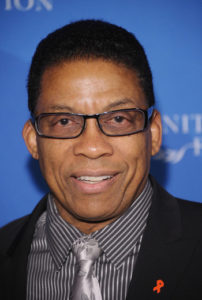
Herbie Hancock
Herbie Hancock was born on this date in 1940. He is a Black musician, composer, and arranger.
From Chicago, Illinois, his parents weren’t professional musicians but lovers of the art form. His father was a bathtub singer, and his mother played a little piano. As a child, Hancock was always interested in music and began music lessons at seven. At the age of 11, he performed with the Chicago Symphony Orchestra. As a teenager at Hyde Park High School, Hancock formed his jazz band.
He attended Grinnell College, majoring in engineering for two years and then changing his major to music. He graduated from Grinnell in 1960 with a major in music composition, where he won an award for the best musical composition with a suite for six woodwinds.
After graduation, he left Iowa for New York City and, at age 20, worked with trumpeter Donald Byrd. Byrd introduced him to Blue Note Records, where Hancock recorded his first solo album in 1963, Taking Off, which included appearances by Freddie Hubbard and Dexter Gordon. This album contained his first Top 10 hit, "Watermelon Man." Soon, Hancock got Miles Davis's attention and invited him to join his new group. While working with Miles, Hancock was introduced to and developed an interest in funk, particularly through James Brown and Sly Stone. After working with Davis for several years, Hancock formed his band, the Headhunters, a sextet that included Julian Priester, Buster Williams, and Eddie Henderson.
With this group, Hancock began to pioneer what would later be called fusion as he, through his original compositions, melded ideas of funk and rock with jazz. Hancock introduced himself to synthesizers. The Headhunters (1973) was the first album Hancock used a synthesizer. Until then, his work was acoustic, except for a Rhodes Electric Piano. The album, the largest-selling jazz album in history, contained "Chameleon," another of Hancock's crossover hits.
Incorporating synthesizers at this pace was mitigated by Hancock's experience with electronics and aptitude for the subject. After a few years, Hancock returned to his roots as an acoustic pianist with the V.S.O.P. Quintet, a recreation of Miles' band (without Miles), and several other jazz artists. In 1983, Hancock released Future Shock, a pioneer electronic piece and a hit on both R&B and dance charts. The single "Rock It" won a Grammy for Best R&B Instrumental, and the album went gold.
Hancock released Dis is Da Drum in 1994, reverberating with West African rhythms. In 1997, Hancock released 1+1, a duet session with saxophonist Wayne Shorter. The following year, he reunited with his old Headhunter bandmates to record Return of the Headhunters. Since then, he has recorded the Future2Future LIVE DVD and THE HERBIE HANCOCK BOX. A definitive 4-CD retrospective spanning 17 years, sampling 25 albums & Herbie's vast musical world! In 2003, Hancock, with Michael Brecker and Roy Hargrove, traveled as "Directions In Music (Celebrating Miles Davis & John Coltrane)."
Since 1972, Hancock has practiced Nichiren Buddhism as a member of the Buddhist association Soka Gakkai International. As part of Hancock's spiritual practice, he recites the Buddhist chant Nam Myoho Renge Kyo daily. In 2013, Hancock's dialogue with musician Wayne Shorter and Soka Gakkai International president Daisaku Ikeda on jazz, Buddhism, and life was published in Japanese and English.
Jazz People
by Harry N. Abrams, Incorporated, New York
Copyright 1976
ISBN 0-8109-1152-3
ACSAP Biographical Dictionary
R. R. Bowker Co., Copyright 1980
ISBN 0-8351-1283-1